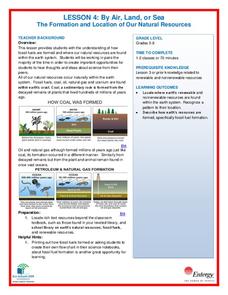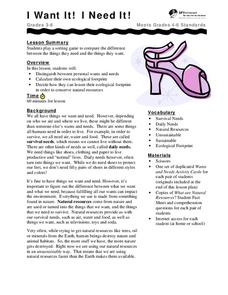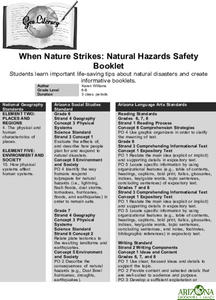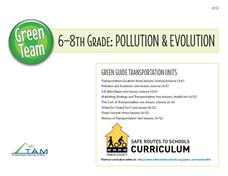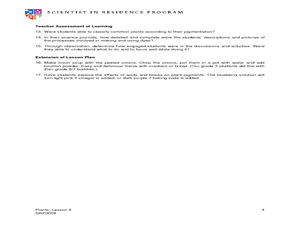American Chemical Society
Natural Resources and Synthetic Materials
All synthetic materials began as natural materials. An engaging lesson begins with a hands-on activity and an example of the type of research that scholars perform independently. Then pupils receive a topic and begin researching the...
National Science Teacher Association
Middle School Sampler: Science
Focus on inquiry-based learning in your science class with a series of activities designed for middle schoolers. A helpful packet samples four different texts, which include activities about predator-prey relationships, Earth's axis and...
National Wildlife Federation
By Air, Land, or Sea: The Formation and Location of Our Natural Resources
Coal forms from the ancient remains of plants that were alive on Earth before the dinosaurs! Scholars use their t-charts from the previous lesson over resources and research to determine if their information is correct. Through analysis...
Saint Louis Zoo
Introduction to Natural Selection: Darwin & Lamarck
Charles Darwin and Jean Baptiste Lamarck are credited for developing the theory of natural selection. After teaching your beginning biologists about acquired characteristics, they read the included selection and answer questions that...
City and County of San Francisco
I Want It! I Need It!
Discuss wants and needs with your elementary ecologists and get them to consider what would happen to our natural resources if we all got everything that we want. Learners play a card sorting game and take an ecological footprint quiz on...
Curated OER
Poetry and Nature
Learners observe an object in nature and record them. In groups, they create a group poem about the same object. They create their own poem based on another object using other their senses to help them. They share their poems with the...
Curated OER
Virtual Nature Walk
Students use the internet to take a virtual nature walk. Identifying animals found in specific forest habitats, they list their characteristics. They research various animals using the internet and create a PowerPoint slideshow with the...
National Wildlife Federation
Yesterday: Our Energy Needs Over Time
How has our relationship to energy changed over time? An engaging exploration challenges learners to create a timeline showing human energy needs and uses over time. Scholars review what timelines are, choose a 50-year period in history...
Curated OER
What is an Ecological Footprint?
Introduce youngsters to the term ecological footprint. Learners identify ways in which humans affect the environment. They look at the problems associated with the use of natural resources, and focus on ways to preserve natural...
Curated OER
When Nature Strikes: Natural Hazards Safety
Students observe the impact of natural disasters on humans, and become aware of the dangers of environmental hazards such as flash floods, tornadoes, and hurricanes.
Curated OER
Natural Disaster
Describe how plate tectonics account for various land formations. Learners discuss different marine sanctuaries and create a poster about tectonic activity in these areas. They share their posters with the class.
Curated OER
Science: Schoolyard Trees
Sixth graders choose specific trees to research while taking a nature walk around the schoolyard. They discuss tree and leaf parts and observe various types of leaves. After writing their reports, 6th graders present them to the class...
Chicago Botanic Garden
Greenhouse Gas Emissions — Natural and Human Causes
What impact do humans have on greenhouse gas emissions? What are the natural causes of these gasses? Thanks to the carbon cycle, carbon dioxide eats away at the earth's atmosphere with the intensified help of humans. Young scientists...
Curated OER
Leaves: All-Natural Solar Collectors
Take a good look at tree leaves and notice the adaptations for collecting solar energy. Pupils trace the margins of five different leaves onto graph paper and count the number of squares covered. They then relate this infomation to the...
NASA
Is It Alive?
Determining whether or not something is living can be more difficult than it seems. Put your young scientists to work defining their own criteria to identify life, then work with three samples to see if they are alive or not.
Curated OER
Settlement Exploration: Then and Now
NASA has crafted an imaginative and memorable series of lessons, "NASA and Jamestown Education Module." This lesson is one of the five components. In it, middle schoolers connect history and science by comparing the settlement of...
Curated OER
It's a Gas - Natural Gas
Young scholars use plastic bottles, water, and condiment packets to simulate how natural gas comes from decaying ocean plants and animals. In this natural gas lesson plan, students also fill out lab packets and answer exit questions.
Safe Routes to School
Pollution & Evolution
Bring together a study of two major scientific topics with a lesson on the relationship between pollution and evolution. With the help of a PowerPoint presentation, hands-on activity. and class demonstration young scientists learn how...
Cornell University
Glued into Science—Classifying Polymers
Explore the unique characteristics of polymers. A complete activity begins with a presentation introducing polymers. Following the presentation, young scientists develop a laboratory plan for creating substances using polymers. They test...
Curated OER
Using Plant Pigments as Natural Dyes
Students create friendship bracelets and quilt squares. In this plant lesson student dye their own string and cotton material with plant pigments. Students use the naturally dyed materials to create the friendship bracelets and quilt...
Curated OER
In Case of Emergency
A natural disaster could strike at any time: do your learners know the school and community emergency plans? Start the school year by honing research and speaking skills in a practical way with this preparedness lesson plan. Youngsters...
Curated OER
Energy Resources: Where Are They and How Do We Get Them?
Future energy engineers visit several stations, each one dedicated to a different alternative source of energy. They describe how solar energy is converted into other forms of energy, the patterns of distribution of energy resources in...
Chicago Botanic Garden
Reflecting on What I Learned About Climate Change
After three eye-opening lessons about our environment, scholars revisit a 10-question survey, reflect on their new-found knowledge, and take action by writing to a representative or creating a public service announcement about climate...
Towson University
Mystery Tubes
How do scientists know they're right? Truth be told, they don't always know. Explore the scientific process using mystery tubes in an insightful activity. Young scientists discover how to approach and solve problems in science, how ideas...




